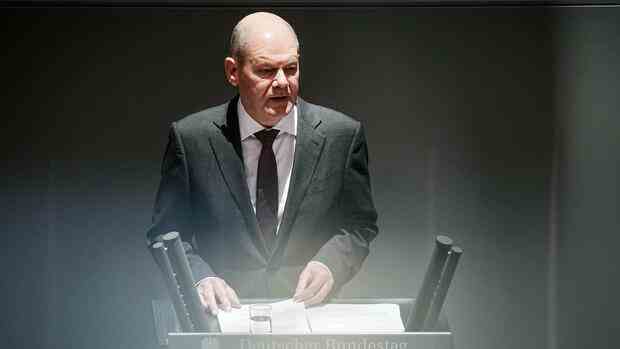In the debate about reforming the Stability Pact, Scholz also warned that competitiveness can only be achieved with stable national budgets.
(Photo: dpa)
Berlin Chancellor Olaf Scholz has called for confidence in further changes resulting from the Ukraine war and the climate crisis. “It’s true: Confidence cannot be decreed. Above all, it is the result of achievements that have already been made,” said the SPD politician on Thursday in the Bundestag in a government statement on the EU summit next week.
But that is exactly why there is reason for confidence in Germany and Europe. “Now it’s about setting out and tackling together so that a good new time is possible,” Scholz demanded.
The Chancellor pointed out that Germany had made itself independent of gas, oil and coal from Russia in just eight months and had switched the supply. “Nobody had to freeze. There was no economic slump and no prescribed shutdown of industrial plants.” This shows: “When it comes down to it, then we can start and upheaval, speed and transformation.”
Union faction leader Friedrich Merz accused Scholz of artificially inducing this confidence. “Confidence comes when people have the feeling that there is a government in place that has a compass, that makes decisions and that gives cause and cause for confidence through actions, not just words,” he said. This is obviously not the case with the traffic light government.
Green parliamentary group leader Katharina Dröge accused the Union of badmouthing the policy of the traffic light coalition without presenting its own concepts. “They have done nothing to give courage, confidence and hope to our country,” she said. Merz is only interested in short-term partisan gains.
Sore points of the coalition
The CDU leader addressed sore points in the coalition, such as the dispute over the federal budget and the future of the internal combustion engine. In Brussels, Germany is slowing down important projects. FDP parliamentary group leader Christian Dürr defended the behavior of the federal government.
Merz also accused the federal government of numerous omissions in the consequences of Russia’s war against Ukraine.
(Photo: IMAGO/Political Moments)
“The fact that we are now holding debates in Europe, including about German positions, is thanks to this federal government,” he said. Struggling to find the right course, for example on the future of the combustion engine, is absolutely right.
Merz also accused the federal government of numerous omissions in the consequences of Russia’s war against Ukraine. From his point of view, he criticized the lack of spending from the special fund for the Bundeswehr and insufficient support for Ukraine. Measured in terms of economic output, other countries would have done more.
Scholz stressed that Germany would work with its European partners to ensure that Ukraine continued to receive weapons and equipment. “It is particularly important to quickly supply Ukraine with the necessary ammunition,” he said.
>> Read here: Comeback of the command economy? Von der Leyen is realigning European economic policy
The left accused the chancellor of relying solely on a complete military victory for Ukraine. “More and more arms deliveries and more and more rearmament, that doesn’t bring us any closer to peace, but that’s why the champagne corks pop every day at the armaments companies,” criticized parliamentary group leader Amira Mohamed Ali.
Financing the admission of refugees
Scholz also took up the federal-state dispute on financing the admission of refugees. The federal government paid states and municipalities more than 3.5 billion euros last year, and this year another 2.75 billion should flow.
This is how the Handelsblatt reports on the Ukraine war:
In addition, Ukrainian refugees could receive citizen benefits. “This means that the federal government bears the vast majority of the costs for accommodation and meals,” said Scholz. He assured: “The federal government, together with the federal states and municipalities, will continue to live up to its responsibility.”
Several countries are currently demanding more money from the federal government for taking in refugees. Lower Saxony’s Prime Minister Stephan Weil (SPD) had said in the ARD “Morgenmagazin” that in his state the federal government would bear about a sixth of the costs of the state and the municipalities.
In view of new demands from the federal states, Scholz emphasized that the federal government already bears the “largest part” of the costs for accommodation and meals for refugees.
(Photo: dpa)
“That’s far too low a rate, which I think needs to be increased significantly,” Weil said. “In my view, a fifty-fifty regulation would be fair.” A federal-state summit with Scholz on the subject is planned for May 10th.
More: You can find the latest news on developments in the Ukraine war in our news blog:
